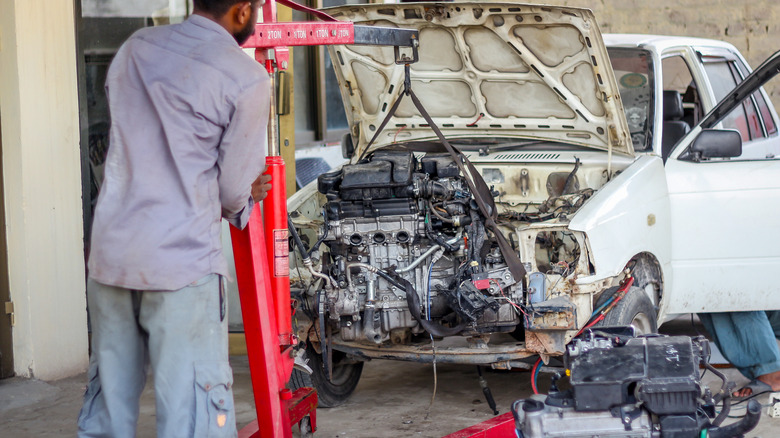
Warlock4590/Shutterstock
If you’re looking for ways to muscle-up the engine in your current vehicle, there are several approaches you can take to achieve that goal. The same is true if you just want to increase said engine’s efficiency. But sometimes a more drastic measure like an engine swap is the easiest way to give your vehicle a boost in power and/or efficiency. If you’re unfamiliar with engine swapping, its name is pretty self explanatory, in that it involves completely removing an engine from an automobile and replacing it with another.
There are, of course, a number of other reasons one might opt for such a procedure, not the least of which is replacing a non-functional engine with one that works. However, these days muscle car enthusiasts are also regularly performing engine swaps in service of boosting a vehicle’s power and performance. Such procedures are understandably expensive to undertake in both monetary costs and in labor. Not only that, but engine swaps also typically require a cache of specialty tools to perform, as well as a vast knowledge concerning the inner workings of an internal combustion engine.
As if costs and expertise weren’t enough, certain legalities regarding engine swaps also come into question, with many US swappers unclear whether or not the procedure is even legal in this country. The short answer to that query is «yes,» as it is currently legal to perform engine swaps in all 50 US states. But the slightly longer and more complicated answer to the question is that you’ll still need to jump through a few hoops before an engine-swapped vehicle is actually deemed street legal.
Laws concerning engine swaps vary by state

Dragon Images/Shutterstock
While engine swapping is currently legal in every US state, it should be noted that the governing bodies in each of those states have different laws concerning what deems a vehicle legal to operate on their roads. So, on top of the 1,001 decisions you’ll need to make before undertaking an engine swap, ensuring the engine being swapped in is approved for use in your state is among the most important. The primary legal hurdle most engine swappers face is making sure the new engine meets the emissions standards set forth by local government.
Before we get to state laws, we should note there are also federal restrictions in place prohibiting the removal or disabling of engine components affecting a vehicle’s emissions, meaning you’ll need to avoid any such tampering when swapping your engine. As for the emissions regulations in your state, they can vary dramatically, so you’ll need to do some homework before you undertake a swap. For instance, many states allow engine swaps only if swapping in a motor from the vehicle’s same model year or newer.
Meanwhile, Texas merely requires any swapped engine to keep the emissions components that were present when the vehicle was manufactured. California, on the other hand, boasts some of the nation’s strictest emission laws, and generally allows swaps only with engines that have been certified by the state. Whatever the case, a vehicle will have to pass a state’s emissions tests before it’s deemed road ready. If you’re not sure where to find your state’s emissions regulations, the information should be available on official Department of Transportation or DMV websites. If not, try contacting said offices by phone or in person for guidance.